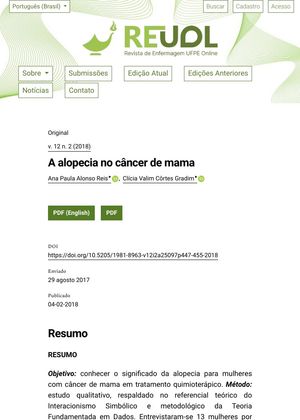Alopecia in Breast Cancer
February 2018
in “
Journal of Nursing UFPE on line
”

TLDR Hair loss during breast cancer treatment affects each woman differently, influenced by her environment and family.
The study "A alopecia no câncer de mama" conducted in 2018, involved 13 women with breast cancer undergoing chemotherapy, aiming to understand the significance of alopecia (hair loss) for them. The study found that women's coping mechanisms had both positive and negative aspects, depending on their individual situations and personalities. They often used adornments, support groups, and family to face societal perceptions of them as ill. The study concluded that each woman's self-perception during this period was individual and influenced by their environment and family. It also highlighted the need for nursing professionals to provide more guidance about alopecia and refer these women to support groups.




